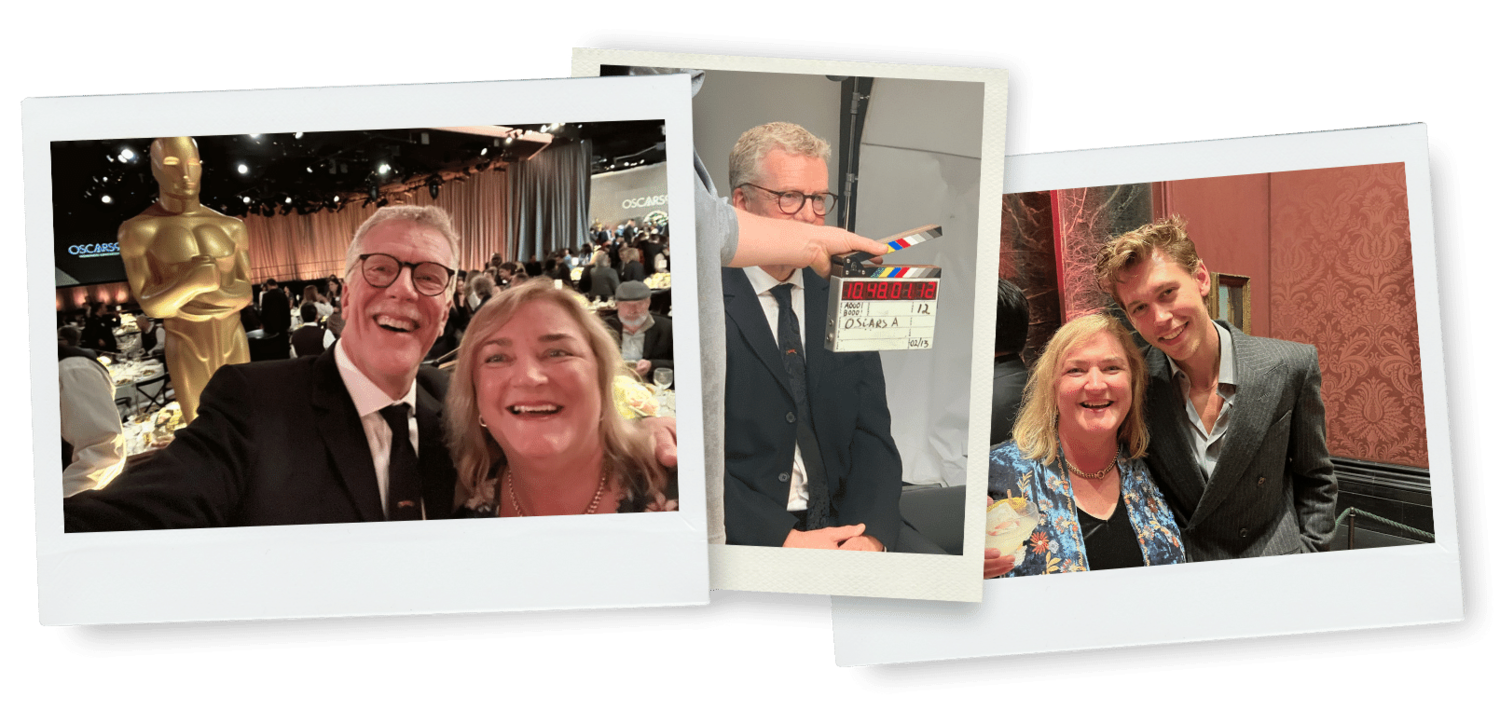Libby Villa and Wayne Pashley of Big Bang Sound Design are renowned pioneers in sound design, responsible for creating some of the most stunning and immersive sonic landscapes on screen. Their latest work on Baz Luhrmann’s Elvis has earned Wayne a well-deserved nomination for Best Sound at the upcoming 95th Academy Awards. Ausfilm caught up with Wayne and Libby to share their insights on collaborating with Baz over the years, their creative process, getting family involved in showbiz and the challenges and joys of working on Elvis. Enjoy this inspiring and uplifting conversation with two good-natured humans who also happen to be amongst the industry’s most talented sound professionals.

Your career in sound design spans decades, including collaborations with Baz on five projects and multiple awards recognition, let’s get some background for context:
Can you tell us how you got started in sound design, and what inspired you to establish Big Bang Sound?
Wayne: Both of our careers started at the Australian Broadcasting Corporation in the late 1980s. I started in 1987.
Libby: And I started in 1988.
W: We were at this wonderful place called Frenchs Forest Film Studios, which was headed up by an incredible producer called Ray Alchin. At the time, he was producing these incredible mini-series like Captain James Cook, Tusitala andThe Boy in the Bush starring Ken Branagh.
L: We were in the drama department of the ABC, which was a very prestigious place within the ABC to work and we were both lucky enough to get jobs there. In those days at the ABC, there were traineeships, which is something that is sorely missing today.
W: We were working on film, it wasn’t this digital age, we were actually lucky enough to work with the tactility of film and that was an amazing time.
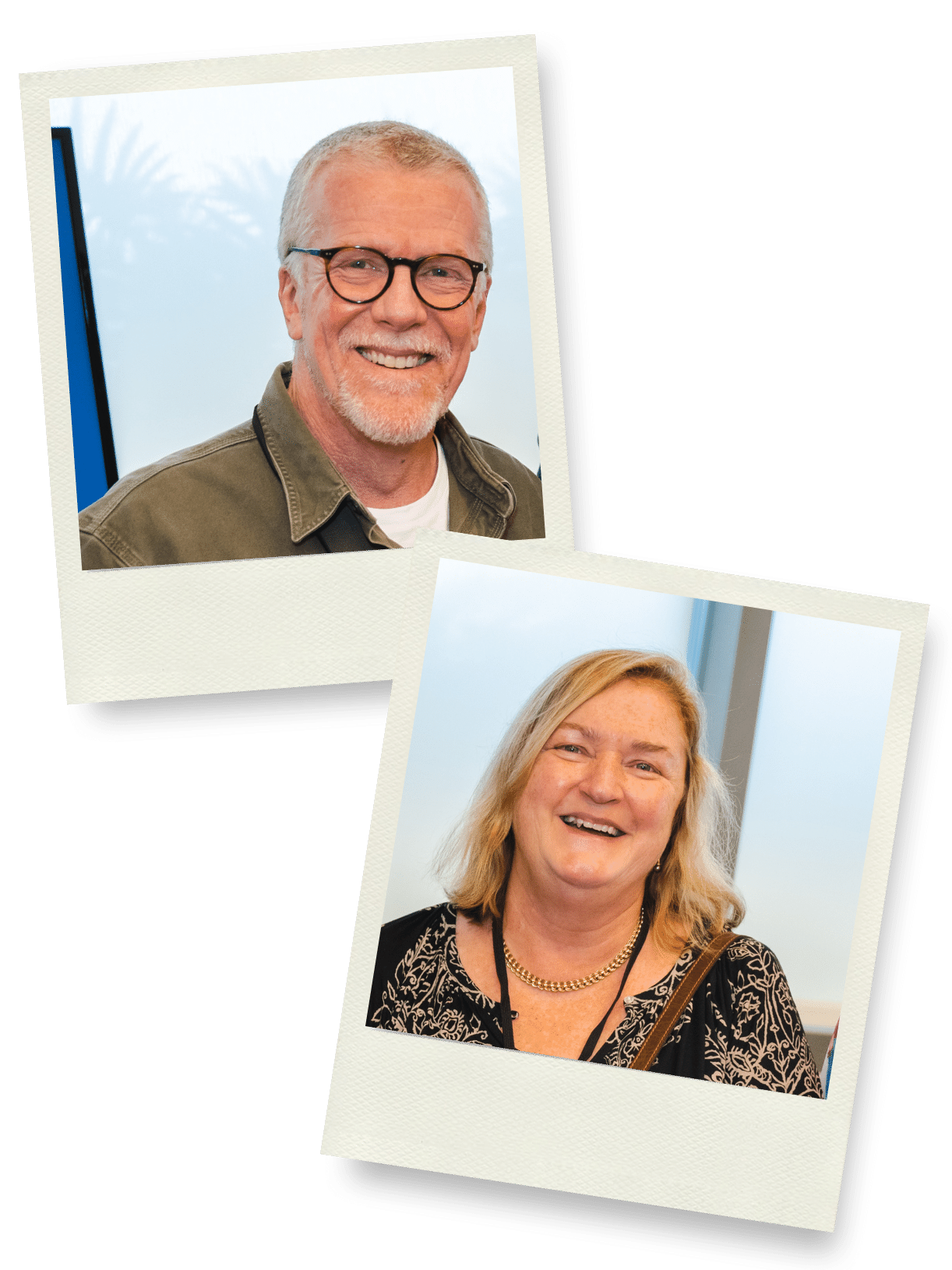
W: We left the ABC after I was there for about four years. I went freelance while Libby travelled overseas. When she came back like two years later, we came together on a documentary called Across the Red Unknown with George Negus, which rekindled our working relationship. We went on to work with all these extraordinary filmmakers, like Peter Weir, Bruce Beresford, Gillian Armstrong, Jane Campion on The Piano, George Miller on Lorenzo’s Oil. I got to meet Baz Luhrmann when he was making his first film, Strictly Ballroom. It was the first digital movie I’m aware of that came out in Australia. One of the producers, Ted Albert, had a wonderful music studio in North Sydney, where they were producing incredible people like John Paul Young and AC/DC. They were using this thing called the Fairlight. It was an Australian invention and one of the first digital platforms in the world. They pointed me in that direction and told me to give it a go.
L: Strictly Ballroom came out in ’92 and Wayne reckons that it was the first time he’d ever used a computer. At this time, the Fairlight was used mainly for recording music and since Ted Albert was a [music] producer, they said ‘You can do some of the sound in our studio, and you can use this thing that we use for recording music’. So, Wayne did the night shift, and during the day they were recording [bands like] The Divinyls.
“Basically, the world changed at that moment for me; Having worked on that incredible digital workstation, and completing Strictly Ballroom with Baz, I came back to Spectrum Films, where I was working at the time with Libby and I said, ‘I’ve just seen the future’. That’s when we invested in our own Fairlight station, which was hideously expensive at the time, and Big Bang Sound was born.”
Wayne Pashley
L: We were working at that time at Spectrum, under the leadership of Hanz Pomeranz, who was a great innovator himself. Once Wayne had that experience, we went into business with Hanz, invested in the gear together and set up under the Spectrum Films umbrella. We started Big Bang up in ’93, operating out of Spectrum Films, which makes this our 30th anniversary.
W: For the first seven or eight years we were working out of Spectrum, then Spectrum moved to Fox [Studios Australia, now named Disney Studios Australia] and we realised it would be best for us to move also, because everyone in the film industry was setting up there, on the southern side of the Sydney Harbour Bridge.
L: When Fox first opened its doors, there were strict parameters established, that a company was only allowed to offer one type of service at the time [this condition was abandoned shortly after opening]. This meant that Spectrum was only allowed to work with picture [post production], and sound companies were only allowed to do sound. So, we had to part company with Spectrum, and that’s when we set up our own space.
Ok, you slipped that in there and that’s a big deal, did you say it’s Big Bang Sound’s 30th Anniversary this year?
L: Yeah, Wayne worked on Strictly Ballroom with Baz in ’92, then we set up business in ‘93, and actually, we just went out last Friday for our 29th wedding anniversary. So, we set up the business, and once we’d gone in together financially, we said ‘you know what, we made it this far, ‘in for a penny, in for a pound.’ And here we are.
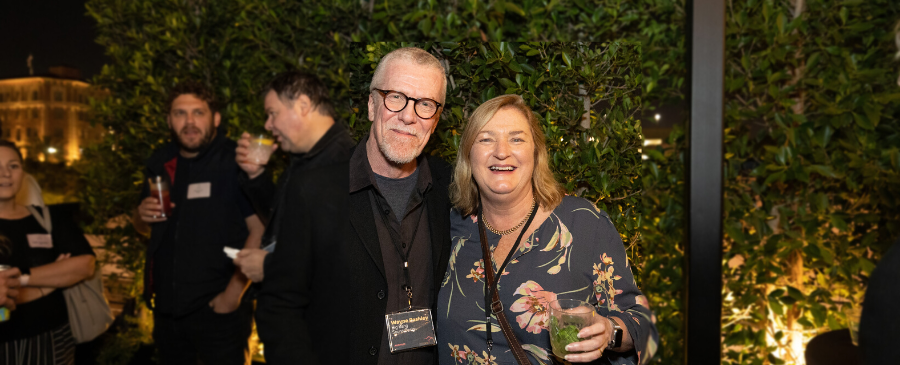
Your professional relationship with Baz Luhrmann dates back to his film, Strictly Ballroom. You’ve since worked with Baz on Australia, The Great Gatsby and now Elvis. Have we missed anything?
L: We also have just worked with him on Faraway Downs. Apparently, the former Chairman of Disney, Peter Rice’s favourite film is Australia, he loved it and suggested it be turned into a mini-series. They had shot so much footage at the time, and Baz decided to take the project up when there were delays in physical production of Elvis due to Covid. By starting that project Baz was hoping to take care of a potential work shortage in the industry.
W: It was really great because Baz was aware that delays in physical production could really impact on-flow in the industry, so he was able to keep a number of post-production teams busy – like us, visual effects, and editorial teams working on Faraway Downs. With Faraway Downs, we’ve basically rebuilt a six-part series for Disney with all the material from Australia that never made it into the feature film.
W: For all his recent films we’ve gotten back together and it’s always lovely because Baz considers us a part of ‘the company’. Baz uses that phrase as they use it in theatre. So it’s really lovely that he sees us as part of that family, as part of the Bazmark company.
L: Also it really is a bit of a family, because my brother Matt is his editor, it is really quite family-oriented (laughs).
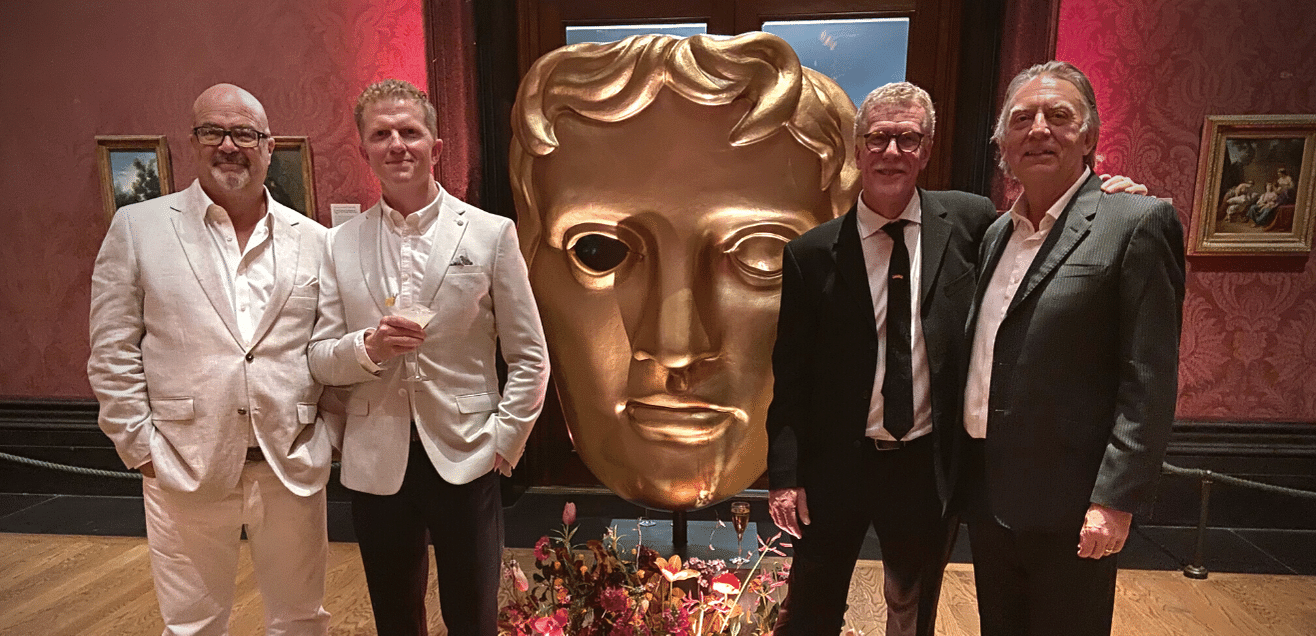
Wow, so Matt Villa, who is also nominated for an Oscar in the category of Film Editing on Elvis, is your brother Libby. Talk about a talented gene pool (Matt features on Ausfilm’s Aussies at the Oscars list). Did Matt start working with Baz through you?
L: Well, Matt got involved in the film industry I would say, entirely because of me (laughs), since his first ever job was as my assistant. But no, he worked with Baz totally separately. Matt was an assistant editor on Moulin Rouge! (Jill Bilcock’s team). That’s where he started with Baz, I think he was the associate editor on Australia and then moved on to editor on Gatsby, and here he is now, Oscar-nominated (along with John Redmond).
Both: A bit of a family affair (laughing).
Can you tell us what it’s been like to collaborate with Baz over the years?
W: To work with Baz is one of the most remarkable experiences for sure, because, yes, you work very, very hard with him, but he gives you so much freedom to express yourself within your own discipline. He’s a master storyteller, he’s an innovator, he is just such a wonderful person to work with. He ultimately expects you to get on with it, to overcome all the obstacles as you go, and do your research – to its max. I’ve found working with Baz one of the most extraordinary things to be involved with, because it’s beyond filmmaking, it becomes an opera, it becomes theatre, it becomes everything we love about the entertainment industry, which he brings.
L: And he expects the best out of every department, so every single department is on their A+++ game, which makes it such a joy. He expects a lot, and in return, he gives so much of himself.
You might be there at 4 in the morning, but he’s right there with you [Wayne agrees], which is unusual to have such dedication. He gives as much as he has asked for, which is a great quality. [Wayne agrees enthusiastically]

As seasoned sound designers, you know the importance of sound in a film. How did you approach the sound design for Elvis and what was your vision for it?
W: I was so enormously excited about the project, we knew of Baz’s plan to create a film about Elvis after The Great Gatsby. I was such a huge Elvis Presley fan since childhood, so to me, it was a dream project. Eventually, it landed and they came to Big Bang to discuss it. Baz, Warner Bros., a couple of the producers, Libby and I. Baz started to virtually pitch the movie to us, which was so interesting because we hadn’t yet read the script and we didn’t know what we were dealing with. He basically told us at the very beginning, we are about to embark on the great American operatic tragedy. I thought we would be taking a slice of Elvis’s life and putting it on screen, but he revealed that we were going to be making his entire life into a feature film, which was completely wild (Laughs).
“The brief that Baz delivered was that he wanted the story to be one harmonious vision, and beyond all else, to protect the legacy of Elvis.
Wayne Pashley
As he pitched the story to us, I saw him thinking in the context of sound, he started to reveal the energy that sound could bring, aside from the music Elvis created that we all know.”
W: As he was speaking, we were all thinking; Okay, what is Elvis Presley?: He is the music, he is the crowds. Thematically, the crowds are going to be a huge aspect of it, because the crowds had such a demand and love for him, ultimately, they were a contributing factor that led to his death. They consumed him until there was nothing left.
Then there were the decades, the 50s, 60s and 70s, within the political landscape of those periods. So much had happened within America culturally, during that time, we started to think about how do we sell those time periods, and how Elvis was the representative of those times for the people.
There was an awful lot to think about, and lots to bring together. We captured sound recordings of the period vehicles on-set in Queensland. Catherine Martin, and the wonderful production team opened their doors to all the props and we recorded everything we could get our hands on.
Then, going into post-production, Baz is very iterative in his filmmaking which means you’re never sitting on any idea for too long. It’s constantly moving and constantly changing. Having worked with him before, we knew what was coming. We knew that he’d want a whirlwind of sonic architecture.
In order to get through Elvis’s life in two and a half hours we had to move through the ideas of his life quickly. Baz really worked post-production to overcome the difficult task, he used so many methods; visual effects, fast editing, montage-narratives and Elvis music mashed up with contemporary. He threw everything at it to form this kaleidoscope. One trick we used within the kaleidoscope of the soundtrack was, we re-recorded real commentary from relevant people at the time, like Colonel Tom Parker, the Memphis Mafia, Hank Snow, the assassination of John F Kennedy or Martin Luther King audios, we recorded real quotes and commentary for these times and characters that swirled in the soundtrack. You don’t hear everything, but it provides a real-life commentary of the time.
L: There were so many layers of sound that came together, people would have no idea, like the Scream Queens, they called them, the women that were overcome with fervent screaming. Those incredible girls had to go to scream school for about a week to learn to scream like they did in the 50s and not blow their voices. Also, people don’t scream like that anymore, the way they did in the era of the Beatles; overcome and overwhelmed with love and desire. It’s not the same sound as a scream of horror, so they had to learn how to do that, which was really amazing.
Elvis showcases some amazing sonic landscapes, what was the biggest challenge in creating them and how were you able to overcome it?
W: Of course, we had to overcome the Covid situation and we did so by utilising technology. We had a cast of 30 speaking characters that were spread all over the world in post-production. After the extras were recorded in immersive sound format, we had eight crowd sessions with this incredible ‘loop group’. Shooting in Queensland, local cast were representing people from all over the US, from the Deep South, through to international stuff in Vegas. There were incredible voice artists who came and filled in all those actors and extras on screen.
L: These were huge sessions and normally you’d have everyone in one room. Instead, we all dialled in on zoom, they were all in their own homes. Half of them, we could see were in their closet to isolate sound, so they didn’t get reverb, standing up against their hanging clothes. I think we had 13 of them on zoom and Source Connect [software that enables audio syncing by including moving picture]. They could all hear each other, see each other, see the picture, and be recorded in sync. It was quite the technological advancement because of Covid. Everyone made it work really well and I don’t think we’ll ever need to go back. We’ve made such advancements as a result of Covid; the distance between Australia and the world is shrinking.
W: I think people are happy not to fly all over the world when they don’t have to, and now we’ve proven it.
What was your favourite aspect of working on this project?
W: One of my favourite aspects was waking up each day and being greeted by Elvis Presley’s music. Our whole team throughout the day were humming tunes.
L: You’d walk down the hallway and hear people singing or whistling, or Elvis was coming out of the rooms and it was just uplifting and happy.
W: It was a great backing track for that time of our lives.
Also, one of Baz’s mantras is to go heavy on research, I could see our team of all ages, even those who may not have known Elvis’s music like we do, I could see them really digging deep into the time periods, the authenticity and sounds that we needed, getting so into it and becoming overwhelmed by his life story, that was such a joy to see.
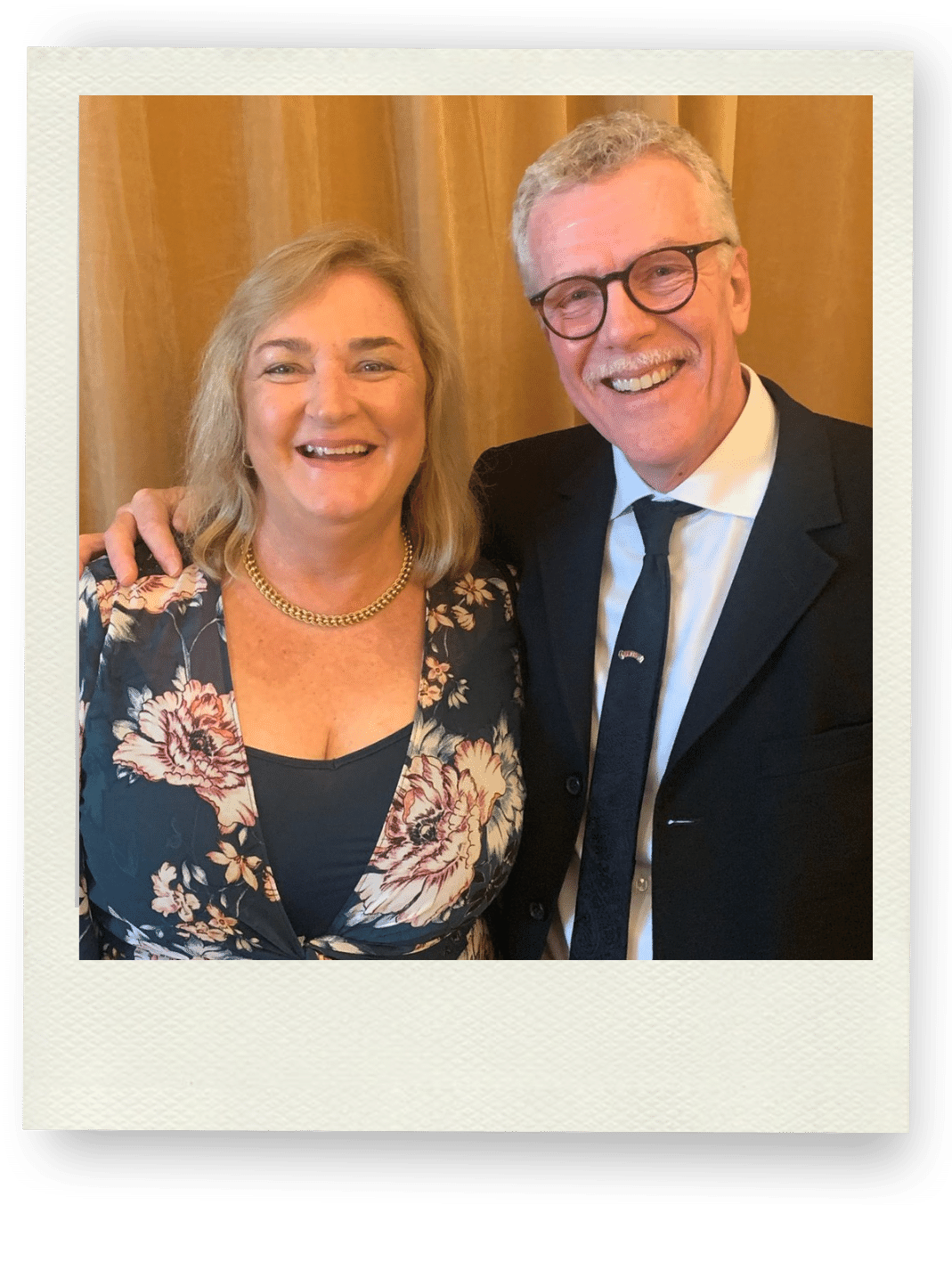
W: In the final stages of the mix, we came to Los Angeles and based ourselves in Hollywood, which enabled Baz to work with us between intervals of his schedule. We’d been working on the film for 18 months or so, and as we were wrapping it up, it started to sink in that Elvis had become such an important friend to all of us. We knew that we were about to let him be released to the world and we found ourselves with such strong concern for our friend and how he was going to be treated.
L: It was such a special project, it felt like we were waving our five-year-old off to school. We were proud of him and at the same time, we all felt really flat to watch him go.
W: Thankfully for Baz’s incredible ability to engage with his audience, all of it translated onto the big screen and he was able to bring Elvis back to life again for audiences to enjoy in a whole new way. That was a favourite aspect of it for me too, seeing the beautiful way that the film had touched so many people.
L: The passion was incredible. The entire cast were so thrilled to be involved in it, every day they were inspired to bring their very best. They were all such wonderful people, and Austin Butler is like, one of the most beautiful human beings on the face of the planet.
L: There was one actress who had been cast as an extra and ended up becoming a featured extra and she was sobbing during ADR because she said, as an actor it was the most joyful experience on set and the most joyful thing to be involved in here now. She was crying because she thought she’ll never experience something like this again. I think the three of us all ended up in tears, and I thought wow Baz, you just don’t get extras saying these things, you’re definitely doing something right here.
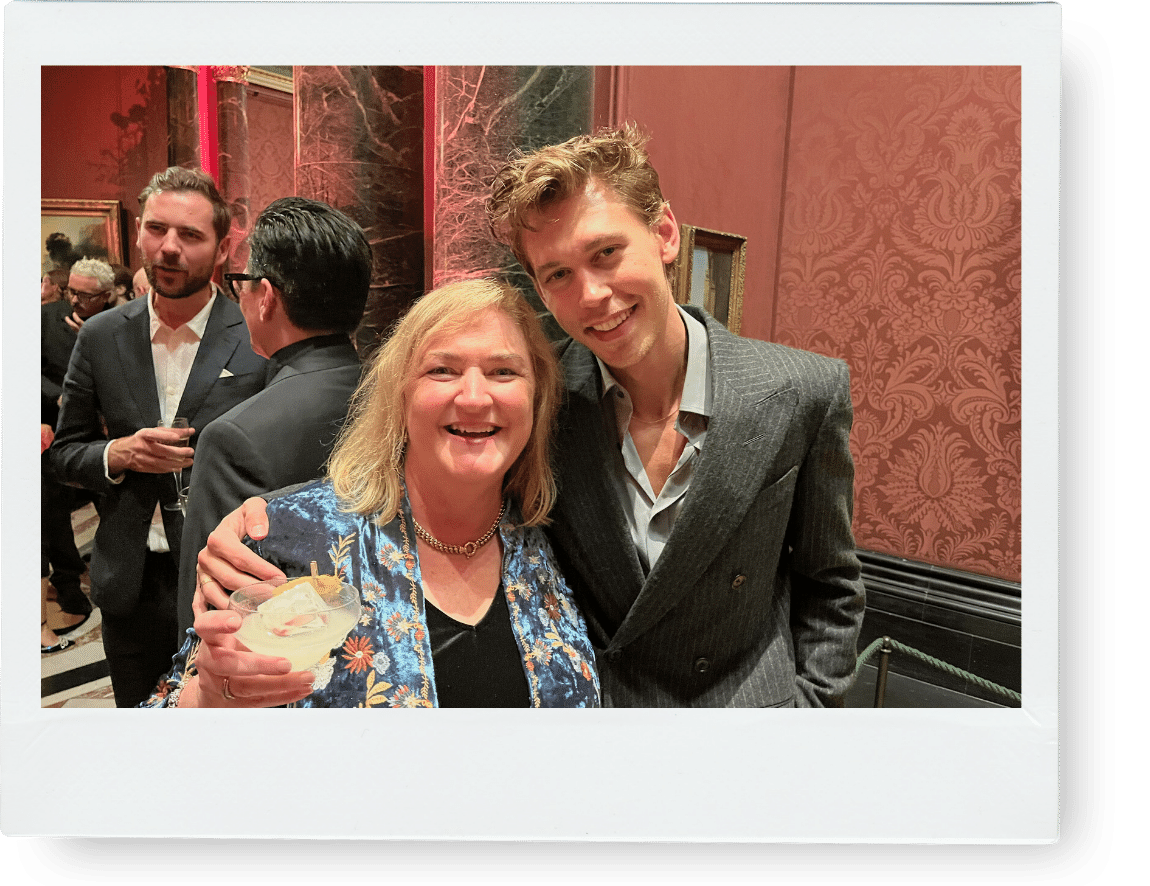
W: That’s the thing though with Baz, he doesn’t call them extras, they are additional actors. Everyone is treated equally.
W: I really do believe that Baz creates an environment as a leader, that encourages every single department, makeup, visual effects, practical effects, stuntmen, all these departments to form a complete singular vision and you could feel it. Everyone knew that there was enormous love and respect for what they were doing, I would say I haven’t experienced anything quite like it.
Integrating new recordings with original Elvis vocals is no small feat, can you give us a glimpse into the process and what it was like working with the legendary musician’s recordings? Can you also walk us through a couple of methods you used to recreate those bygone days for the film’s soundscape?
W: Oh this is a great story, what happened was, during the very early camera tests we did with Austin Butler, Mandy Walker and David Lee, our fabulous and onset recordist in the music department [who shares his Oscar nomination with Wayne], we did sync tests. This was before Covid happened, and we were literally doing playback tests, to make sure we were all going to be in sync with Mandy and the cameras and things. Baz came in at lunchtime and asked, ‘How’s it all going?’ We said ‘great, we’re all in sync, it’s going to work on playback’ – assuming we were using Elvis Presley’s original recordings at that point.
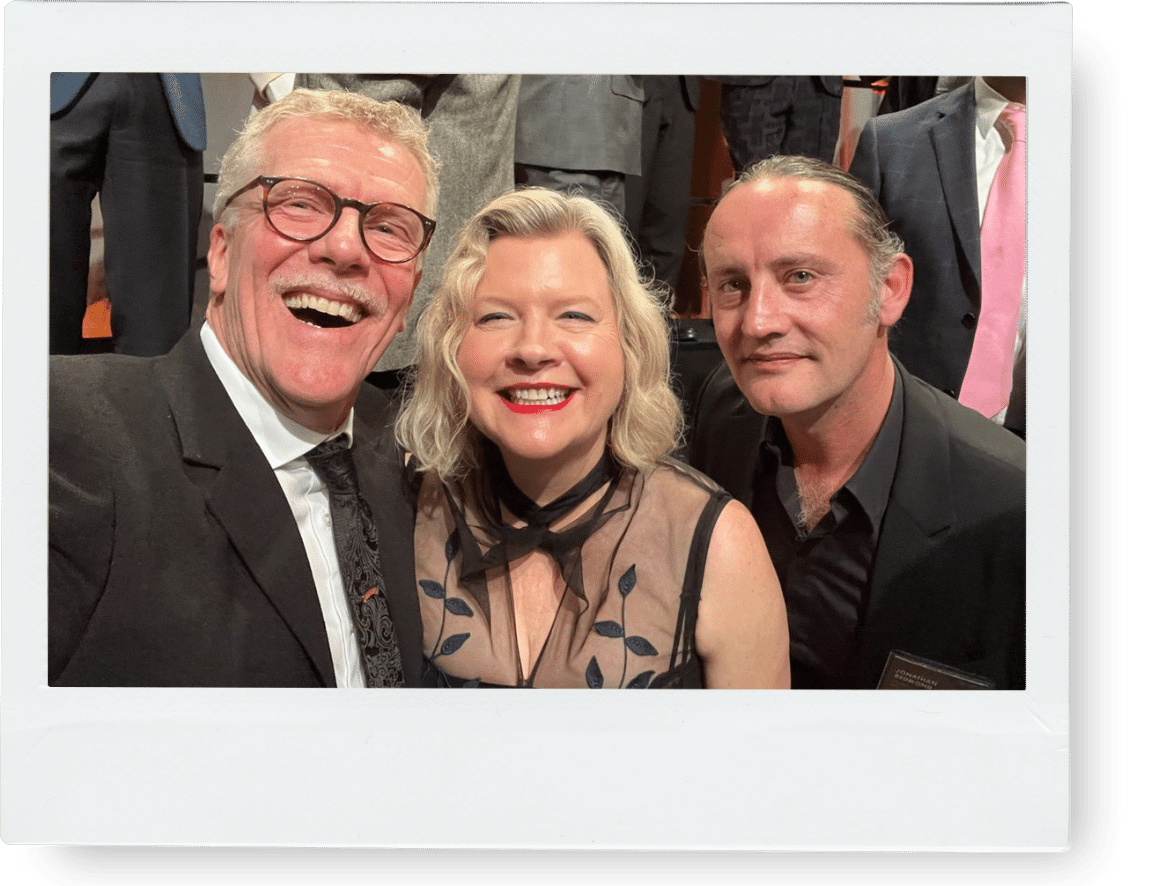
Baz then turned around and said, ‘Okay, if that’s working, scrap it, go have lunch, bring in live musicians, let’s try that out.’ We all looked at each other, and there was a mad scramble, live musicians were called in and everyone arrived on set, it was a very rudimentary set. Meanwhile, Austin was using the very microphone that Elvis once used from the 50s. He performed live, we recorded it, including the musicians and everything.
“Right then and there, I felt that I had witnessed Elvis Presley himself. We all did. Baz came to me at the end of it and said, ‘Wayne, we are now going to record Austin Butler for every performance.”
Wayne Pashley
W: So that changed the rules and expectations at that moment and we had to prepare, not only on a technical level but also Austin now had to be ready for every performance piece. That’s the reason why we broke it up into three parts: The 50s was all Austin; the 60s, or the ‘68 comeback was our first merge of Austin and Elvis Presley; same thing happened in Las Vegas in the 70s, where Austin performed every piece – as did Elvis, of course – and we were able to merge the two. There’s no question that Austin could have done the scenes completely on his own, but some of them are so well known, that made it difficult. The ‘68 comeback was also tricky because it was mono, from NBC, but Austin to was able to fill in the holes where Elvis went off mic, or the sound was distorted and we merged the two.
W: We had vintage microphones completely restored for each of the three decades, these were Elvis’s favourite mics. So whatever Austin sang was the same sonic quality as Elvis.
When we got to the 70s, multitrack technology had been implemented, so you had the backing singers, drums, brass and Elvis isolated on multiple tracks, which was great because we could then enhance those. The music department was able to give the drums more beef, or record more backing singers to help what they call the stems of the of the original multi-tracks from the 70s – which we received from MPM and RCA.
So, as wonderful as those 1950s recordings of Elvis are, they’re mono, and very difficult for a modern immersive mix, which is why we merged instruments and amps of the period into it along with Austin’s vocals
L: Austin was the secret weapon and once we realised how much he could sing, we just got him in there.
W: Oh, yeah. I have to credit Austin’s incredible research and studies, even during post-production, he came in and did additional recordings like breathing, the Vox work, his onstage sounds, down to his laughter. Austin got the way Elvis would laugh down to a T.
Being nominated for Best Sound at the Oscars is a massive achievement, how does it feel to receive recognition for all your hard work?
W: Honestly, when we got nominated, all I can say is I was so, so proud of the team. Everyone worked so hard, it was a huge thrill. It was one o’clock in the morning when the announcement was made, we cracked open a bottle of single malt and just drank to everyone’s efforts, because they finally got the recognition that they deserve.
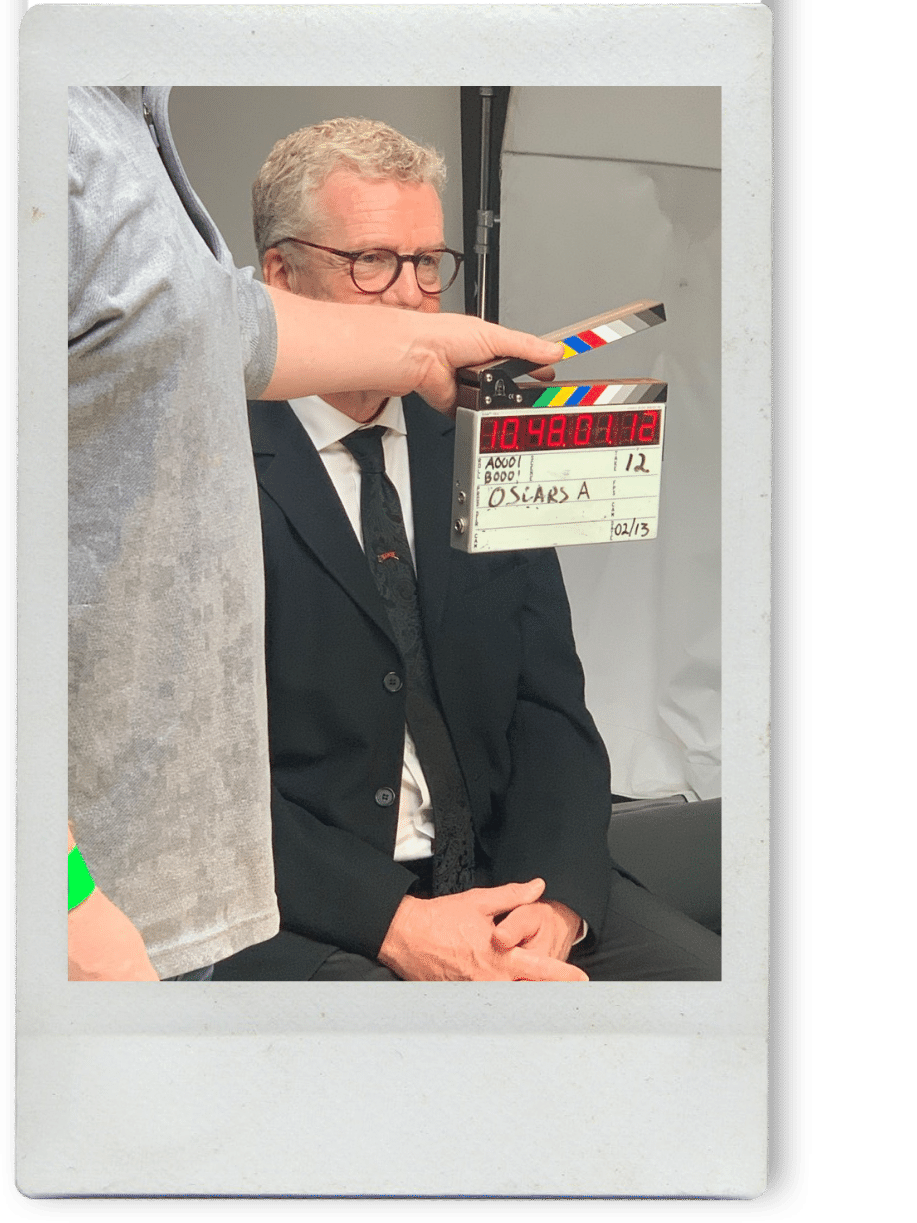
Quite right, this recognition is not just for you, but for your team at Big Bang Sound Design as well. Are you able to tell us a bit about how your team work so well together to produce such incredible results?
W: I would say it comes from a massive passion for our work, respect and love for each other. There are people on our team that we’ve worked with for 30 years, and there’s a shorthand that comes with that, in terms of style, tone and expectation at the end of the day. It’s a strong combination with Libby’s leadership and the talented team who give their utmost on every project. We have so much trust in them and the work they do.
L: And in keeping with the family theme, our two sons and our niece now work with us too.
“One of the main reasons we started Big Bang is because we wanted to create a happy working environment, so we built it that way from the start. We also specialise in sound and nothing else, which means we get to give sound the respect it deserves, we give our team the respect they deserve too, and in return they give us their all.”
Libby Villa
W: We’ve all got a great love for sound, it is a dark art, it’s not tangible at all. Sound is a bit like rattling smoke, but you can give so much subtext to the story, we all have a huge passion for what we do.
L: It really is 50% of the audience’s experience, and since we focus entirely on sound, we’re able to hone in on the minute details that really bring a project to life. I think that’s what attracts our clients to us. They know they can confidently leave a project in our hands, and in turn we generate these positive, respectful working relationships where they give us the freedom to do what we do best and our team apply their passion and expertise wholeheartedly into the project.
What was the biggest lesson you learned while working on Elvis, or with Baz in general, over all these years?
W: Every time I’ve worked with Baz has been a great opportunity to become a risk-taker. When I enter a project, I try to keep fear at bay and I’ve seen what that can achieve. Baz is not afraid to go too far – he ultimately wants to go too far and break it, that way he knows what exact point to bring it back to.
I always come away with an incredible sense of innovation and risk-taking on a project with Baz, which I’ve taken with me. I like to bring that mentality to other projects also and work with filmmakers in holding their fear at bay. Allow yourself in your art to take the risks, because you’ve got one life, let’s go, let’s make the most of it.
L: Baz’s company motto is ‘A life lived in fear, is a life half-lived’. He brings that to every production and you sometimes wonder where he’s going on a project because he pushes it so far, but he always dials it back in and brings it all together. It inspires you to take those risks.
W: Working that way makes what you do become your art form, your discipline and craft, and it’s incredibly rewarding because no idea is stupid. You get to see what it looks like and you can always come back if it doesn’t work out.
L: And Baz always opens it up to the room, which I love. He’ll ask the room what they think of it, then he’ll go off to think about it and he’ll often follow up on collaborative ideas, he really values everyone’s input and is happy to share his platform.
On that note, what’s one piece of advice you would give to someone interested in a career in sound design?
W: For someone wanting to enter sound design and any discipline really, my advice would be, you’ve got to have a heart full of passion and love for it. And you can’t do it on your own, surround yourself with people who have passion and love for what they do. I’ve seen the way it plays out and at the end of the day, it’ll end up on the screen. The audience will feel that passion and love, and you will get an equal response of enthusiasm. On the other side of that, I’ve seen and worked on projects to the contrary and that also ends up on the screen.
“Fill yourself with passion and love for what you’re doing, It will ultimately transcend and you will be successful at it.”
Wayne Pashley
Before we go, can you share any upcoming projects that you’re particularly excited about?
W: We’ve just been collaborating again, with Baz Luhrmann on Faraway Downs, a really exciting six-part mini series, which works incredibly well in that format. Every episode has a cliff-hanger and its surprising how it all worked out. That will be released this year by Disney. We also just started once again with Abe Forsythe, Jodi Matterson, and Bruna Papandrea with Made Up Stories on Wolf Like Me, season two. That’s been a lot of fun, we did season one and we’ve got the team back again. We’ve seen the first three episodes, and this series is going to kick some ass, it’s even hotter than the first. Abe is another one of those filmmakers that I absolutely adore, he is so different and has his own voice. I love working with him because he’s one of the naughtiest, darkest filmmakers I’ve ever come across.
W: We’ve got a couple of other feature films coming up this year, which I’m excited about as well but I’m not sure if I can talk about those yet, so you’ll have to just wait and see.
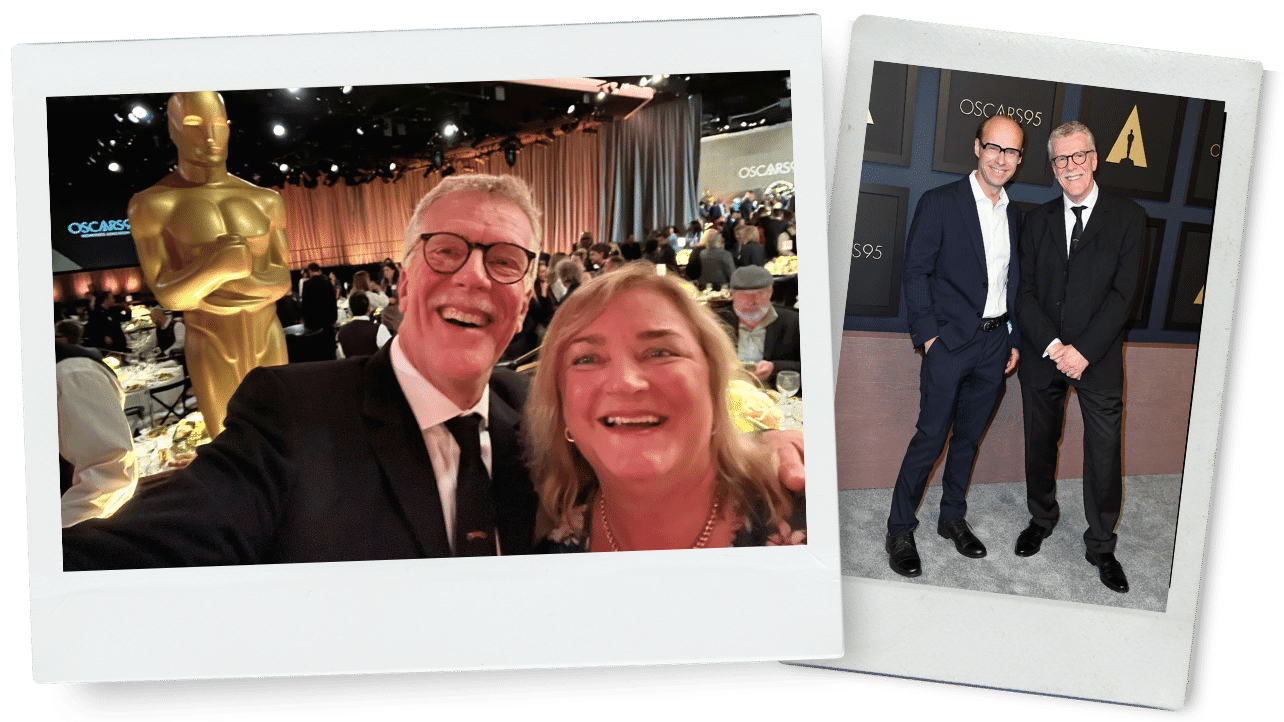
Libby and Wayne, Best of luck to you at the Oscars, we’re proud of the work you achieved no matter what the outcome!
